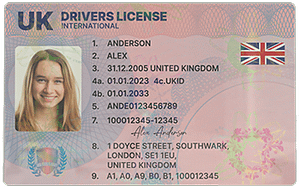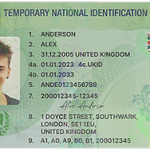The hospitality industry, encompassing hotels, restaurants, bars, and various entertainment – related establishments, is a crucial part of the global economy. However, it faces numerous challenges, one of which is the prevalence of fake ID cards. These counterfeit identification documents have far – reaching consequences for the industry, affecting aspects such as legal compliance, customer safety, and business reputation.
Legal Consequences
One of the most significant impacts of fake ID cards on the hospitality industry is the legal risk it poses. In many countries, serving minors alcohol or allowing them into age – restricted areas is a serious offense. When establishments unknowingly serve underage customers due to fake ID cards, they can face hefty fines, license suspension, or even closure. For example, in the United States, if a bar is found to have served alcohol to a minor with a fake ID, it can be fined thousands of dollars and may have its liquor license revoked. This not only affects the immediate financial standing of the business but also has long – term implications for its viability.

Moreover, the use of fake ID cards can also be associated with more serious criminal activities. If an establishment becomes a hub for underage drinking facilitated by fake IDs, it may attract law enforcement attention for related issues such as drug use, violence, or property damage. This can lead to further legal complications and damage to the establishment’s reputation in the community.
Customer Safety Concerns
Another important aspect is customer safety. Minors who gain access to age – restricted areas or are served alcohol using fake ID cards are at a higher risk of harm. Alcohol consumption by minors can lead to a range of health problems, including impaired judgment, accidents, and long – term damage to the developing brain. In addition, in crowded entertainment venues such as nightclubs or bars, underage patrons with fake IDs may be more likely to be involved in altercations or become victims of crime. For instance, a minor who is drunk due to being served alcohol with a fake ID may be more vulnerable to being targeted by predators or getting into fights with other patrons.
Furthermore, the presence of fake ID – using minors can also create an uncomfortable and unsafe environment for other legitimate customers. Families or responsible adults may be deterred from visiting establishments that are known to have issues with underage access, which can have a negative impact on the business’s customer base and revenue.
Reputation and Brand Image
The reputation of a hospitality establishment is crucial for its success. News of an establishment being caught serving underage customers due to fake ID cards can spread quickly through word – of – mouth, social media, and local news outlets. This negative publicity can severely damage the brand image of the business. Customers may lose trust in the establishment’s ability to enforce age – restrictions and maintain a safe environment. For example, a hotel that has a reputation for allowing underage access to its bars or clubs may find it difficult to attract corporate clients or families on vacation.
Even if an establishment has strict ID – checking procedures but still falls victim to sophisticated fake ID cards, the public perception may still be that the establishment is not doing enough to prevent underage access. This can lead to a decline in customer loyalty and a reduction in business, as customers are likely to choose competitors that are perceived as more responsible and reliable.
Financial Implications
The financial impact of fake ID cards on the hospitality industry is significant. In addition to the potential legal fines and costs associated with license suspension or revocation, there are also lost revenue opportunities. If an establishment has a damaged reputation due to fake ID – related issues, it may experience a decrease in customer traffic. This means lower sales of food, beverages, and other services. For example, a restaurant that is known for having issues with underage patrons may see a decline in the number of regular customers, resulting in lower overall revenue.
Moreover, establishments may need to invest in additional security measures and staff training to combat the problem of fake ID cards. This includes purchasing ID – verification devices, such as ID scanners, and providing training to employees on how to detect fake IDs. These additional costs can put a strain on the business’s budget, especially for smaller establishments that may already be operating on thin profit margins.
Common Problems and Solutions
- Problem: Difficulty in Detecting Sophisticated Fake ID Cards
Solution: Hospitality establishments should invest in high – quality ID – verification technology. ID scanners can not only check the authenticity of the card’s magnetic stripe or barcode but also analyze the card’s holograms, microprinting, and other security features. Employees should also be trained regularly on the latest types of fake IDs and how to spot them. For example, some fake IDs may have incorrect font styles or misaligned images, and employees should be able to identify these discrepancies. - Problem: Employees Being Inexperienced or Inattentive During ID Checks
Solution: Provide comprehensive and ongoing training to employees on ID – checking procedures. This training should include not only how to physically examine an ID but also how to interact with customers during the process. Employees should be taught to be firm but polite when asking for ID and to be vigilant for any signs of nervousness or evasiveness from the customer. Role – playing exercises can be used during training to simulate real – life ID – checking scenarios. - Problem: Lack of Standardized ID – Checking Policies Across the Industry
Solution: Industry associations and regulatory bodies should work together to develop and promote standardized ID – checking policies. These policies should outline the minimum requirements for ID checks, such as the types of identification that are acceptable, the level of scrutiny required, and the procedures to follow in case of suspected fake IDs. By having a unified approach, it becomes easier for establishments to comply and for law enforcement to monitor. - Problem: Customers Using Multiple Fake IDs or Borrowing Real IDs
Solution: In addition to ID scanners, establishments can implement additional verification methods. For example, asking for a secondary form of identification, such as a credit card with the same name as on the ID, can add an extra layer of security. Some establishments may also consider using facial recognition technology in combination with ID checks to ensure that the person presenting the ID is the actual cardholder. - Problem: Rapidly Evolving Fake ID Technology
Solution: Establishments should stay updated on the latest trends in fake ID production. This can be achieved by subscribing to industry newsletters, attending security – related seminars, and collaborating with law enforcement agencies. By being aware of the new techniques used by counterfeiters, establishments can adjust their ID – checking procedures and invest in appropriate counter – measures in a timely manner.


